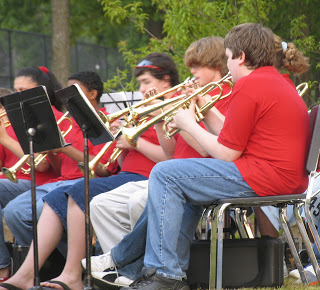“Fear makes the wolf bigger than it is.” ~ German proverb
Monthly Archives: February 2011
What is Intellectual Courage?
Compiled and written by Lisa and Jennifer:
“Nothing in life is to be feared. It is only to be understood.”— Marie Curie
“The conventional view serves to protect us from the painful job of thinking.”— John Kenneth Galbraith
“If you believe everything you read, you better not read.”— Japanese proverb
For inspiring true stories, ways to recognize and coach intellectual courage in ourselves and our children…READ ON!
This fascinating lecture by Dan Gilbert on TED.com indicates how easy it is to deceive ourselves, and how thoroughly we must be willing to question all of our assumptions. It’s about 35 minutes long and well worth watching; grab a cup of coffee and be prepared to think!
- asking questions
- listening to questions
- working on puzzles and thought problems
- memorizing long poems
- studying music or a foreign language
- applying for and using a library card
- disagreeing with your own mind
- seeking out opposing points of view
- deciding you’d rather have peace of mind than be right
- reading banned books
- curiosity
- taking as long as necessary to learn something, rather than being satisfied with a superficial understanding
- offering opinions
- listening to others’ opinions
Lack of intellectual courage looks like:
- not asking questions
- not listening to questions — or the answers
- giving up quickly on new material or new ideas
- not admitting that you don’t know
- repeating “facts” without questioning them
- superstition
- inability to recognize connections between ideas
- lack of curiosity about other people, other ideas
- pretending you don’t know what you really do know, like not opening the bills or test results
- accepting the first answer
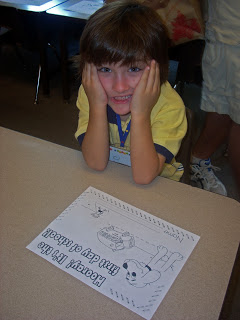
Intellectual courage sounds like:
- “Can you explain that to me again?”
- “I’ve changed my mind.”
- “How do you know that’s true?”
- “Where can I find more information?”
- “I get it!”
- “Wow, that’s really interesting!”
- “Show me how you did that.”
- “I never thought of it that way.”
- “What do you think?”
- “I wonder if…”
- “Hmm, that didn’t work out. Let’s try that problem again.”
- “Are we even asking the right questions about this issue?”
- “What questions would you ask if you were in my shoes?”
- “I’ve got a great idea!”
Lack of intellectual courage sounds like:
- “Don’t ask so many questions!”
- “Don’t be ridiculous!”
- “I hate tests.”
- “I hate school.”
- “I’m terrible at math/spelling/languages/reading/etc.”
- “We’re just supposed to solve the problem this way.”
- “Keep your opinions to yourself.”
- “Why do we have to learn this?”
- “I’m so stupid.”
- “Nobody’s interested in what you have to say.”
- “That’s how we’ve always done it.”
- “How should I know?”
- “Reading is a waste of time.”
Grab Some Lion’s Whiskers!
Here are some tips for developing intellectual courage for yourself and your kids:
- keep reference books handy so you can look things up (yes, we still need actual books)
- get big maps for your walls and explore them with your kids
- encourage your children to ask questions (and be patient when they start asking!)
- pick a topic you’re all interested in and explore it together
- let your child tell you something interesting (even if you already know it)
- keep different kinds of puzzles and games available (using words or numbers), especially ones that require creative problem-solving or “out of the box” thinking
- let your kids catch you reading
- learn how to say “I don’t know. Let’s find out.”
- compete to see how many uses you can find for everyday objects: pencils, paper, tin foil, sugar, money, cotton balls, CDs
- play memory games in the car to encourage observation and focus
- take an active interest in what your children are learning and ask them what their opinions are about what they are learning
- at dinner, ask your family about what they’re reading or ask them for one new (interesting to them) fact that they just learned
- share trickster tales and stories that celebrate quick-wittedness and fantastic feats
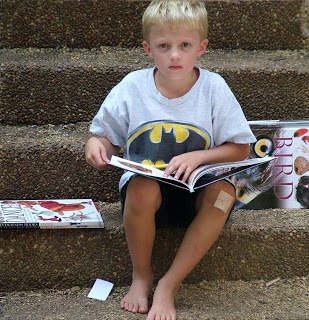
What are your ideas about intellectual courage, your parenting tips to promote it with kids, or your favorite intellectual courage story (fiction or non-fiction)? We’d love to hear from you!
Here are some posts on the blog that are related to intellectual courage: Courage As an Antidote to Fear, Two Parables of Rumi, David and Goliath, Relativity, The Way We Hold Our Babies,
5-Minute Courage Workout: Thinking Outside the Box, The Gate of Heaven and the Gate of Hell, The Sky is Falling? Really? , The Briar Patch, Right Brain Workouts for Kids & Parents
A Mango Tree and a Baby, two stories, Courage Book Review: Three by Idries Shah, A Hurricane is Coming
Here’s more on the types of courage:
What is Physical Courage?
What is Social Courage?
What is Emotional Courage?
What is Moral Courage?
What is Spiritual Courage?
Courage Quote of the Day
“Man cannot discover new oceans unless he has the courage to lose sight of the shore.”
— Andre Gide
Thoughts?
Shout Out
Welcome to readers in Germany, Denmark, Netherlands, Czech Republic, Croatia and Spain! Thank you for joining us, and please share the blog with fellow parents, teachers and friends.
The Journey Our Kids Are On
In my chair beside her in the circle I did a silent “hear hear.” To be fair, however, I had helped stack the deck in favor of her opinion. I had offered to host her in my home, which I had chosen because of its proximity to school. She had spent a week walking the autumn leaf-strewn sidewalks of our neighborhood between my house and the lower school (grades 1-8) and the preschool a few blocks away. It was only necessary for her to get in a car when she went to the Forest Kindergarten in the big state park a few miles distant.
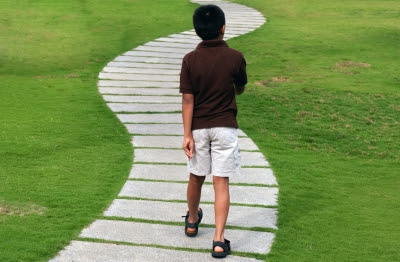 |
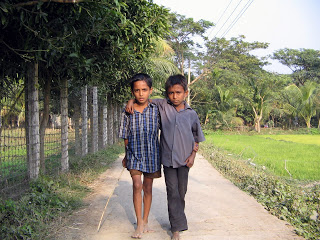 Do I let K. wander unknown streets? No. Do I have her call me when she has arrived on foot at Lisa’s house to visit B.? Yes. Have I taught her what to do if she feels threatened by a stranger? Yes. Have I walked our neighborhood streets with her again and again and pointed out the street signs to her? Yes. Have I made a game out of letting her navigate when we are driving around town? Yes. Yes, yes, and yes, I have tried to teach her how to navigate our neighborhood, and I have given her opportunities to do it without hovering over her shoulder or even tailing her in the car at a distance. Did I feel like throwing up the first time she walked away from me down the street by herself? Yes. But in allowing her space to learn courage and become the hero of her own story, I am trying to learn it myself, as well.
Do I let K. wander unknown streets? No. Do I have her call me when she has arrived on foot at Lisa’s house to visit B.? Yes. Have I taught her what to do if she feels threatened by a stranger? Yes. Have I walked our neighborhood streets with her again and again and pointed out the street signs to her? Yes. Have I made a game out of letting her navigate when we are driving around town? Yes. Yes, yes, and yes, I have tried to teach her how to navigate our neighborhood, and I have given her opportunities to do it without hovering over her shoulder or even tailing her in the car at a distance. Did I feel like throwing up the first time she walked away from me down the street by herself? Yes. But in allowing her space to learn courage and become the hero of her own story, I am trying to learn it myself, as well.(strolling boy photo: Arvind Balaraman, FreeDigitaPhotos.net)
This is our most popular post — please consider posting it to Facebook or tweeting it for us.
Shout out
Shout out
Keeping up with the blog
Don’t forget, you can hit the Facebook Like button on the upper right side of this page, or the Follow button lower down to get announcements when there’s something new to read on the Lion’s Whiskers blog.
Update: you can now subscribe by email. See the box in the upper right? Yes, that’s it! Sign up and our posts will come directly to your email.
What is Social Courage?
Compiled and written by Lisa and Jennifer:
“Courage is what it takes to stand up and speak; courage is also what it takes to sit down and listen.” —Winston Churchill“Every man has his own courage, and is betrayed because he seeks in himself the courage of other persons.” —Ralph Waldo Emerson
For inspiring true stories, ways to recognize and coach social courage in ourselves and our children…READ ON!
Here’s a three-minute video from earlier this year that shows a young man demonstrating social courage on behalf of his family in a public forum. He is heartfelt, articulate, and brave. (note: we also love that he thanks his parents.)
Social courage looks like:
- having a personal style and sticking to it, regardless of fashion trends
- performing in a play or concert
- delivering an oral report with confidence
- inviting the kid who often gets left out to your birthday party
- organizing a charity event
- volunteering as a mentor or youth group leader
- finding role models who reflect our own values
- stepping away from a clique that has become unhealthy
- standing up to peer pressure
- resisting the temptation to lie or cheat, even if a close friend or family member asks you to
- shaking hands and introducing yourself
- traveling to a foreign country where you may not know a word of the language
- allowing others to shine, succeed, win, and even be right!
- being on time
- helping play host/hostess at a family party
- admitting mistakes
- running for class/school/public office
- apologizing
- keeping your word
- asking for a raise
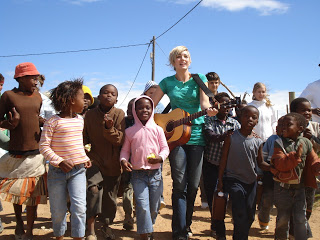
Lack of social courage looks like:
- chasing fashion trends
- allowing others to make your decisions
- standing at the back of a group photo or presentation
- gossiping
- being a bully or a passive bystander
- always sitting at the back of the class
- refusing or “forgetting” to vote
- refusing to sign up for an after-school or extra-curricular activity
- refusing to make new friendships and avoiding situations where you don’t know anyone
- waiting to see what others do first
- not raising your hand
- running away from a mistake or accident
- breaking appointments when something “better” comes up
- texting or Facebooking bad news to a friend instead of doing it in person
Social courage sounds like:
- “Hello, my name is ________.”
- “So what if they don’t like it? I do.”
- “I’m gay.”
- “Yes, I can help you fund-raise.”
- “I’ve decided to ask ____ out on a date.”
- “I know it takes time to make friends. I just have to keep trying.”
- “I wasn’t invited to her party, but that’s okay.”
- “I’m trying out for the team/the play/the competition.”
- “Stop picking on her.”
- “Here’s why I want you to vote for me.”
- “I’d like you to meet my family.”
Lack of social courage sounds like:
- “But everyone’s wearing them!”
- “Can’t you be more like the other moms?”
- “I don’t like meeting new people.”
- “You’re embarrassing me!”
- “My child isn’t usually like this!”
- “I don’t like people like that.”
- “If I do/don’t do _______ people won’t like me.”
- “People like that scare me.”
- “I didn’t do it!”
- “You can’t wear that!”
- “They’ll all stare at me!”
- “If I can’t go to this party I’ll be a loser!”
Grab Some Lion’s Whiskers!
Here are some tips for developing social courage for you and your kids:
- practice telephone etiquette, role-play phone conversations with your kids
- be a model of courtesy: shake hands, say thank you, greet people by name
- play Follow the Leader, Simon Says, Mother-May-I?
- play charades and or deliver short after-dinner speeches from a grab bag of topics for fun
- have a dress-up or costume box and dip into it often — not just at Halloween
- participate in school or local government by attending meetings and expressing your opinions
- if you are a make-up wearer, go without for a few days; if you’re not a make-up wearer, try wearing some for a few days
- wear a dramatic hat to the supermarket; get your kids clown noses
- watch some of the videos on Improv Everywhere or Free Hugs Campaign with your kids and discuss what it might be like to participate
- make sure that family photo albums include everyone—in other words, don’t hide behind the camera!
- share stories about strong leaders

A great example of a child showing social courage is this boy who asked his local government council if they would build a playground.
Here’s more on the types of courage:
What is Physical Courage?
What is Emotional Courage?
What is Moral Courage?
What is Intellectual Courage?
What is Spiritual Courage?
This is one of our most popular posts. Please consider posting to Facebook or tweeting it for us. Thanks!



